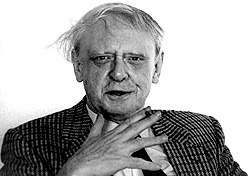“…it was a cardinal rule in the East not to show one’s true feelings.”
Fiction, Time for a Tiger (1956)
John Anthony Burgess Wilson, – who published under the pen name Anthony Burgess – was an English writer and composer. From relatively modest beginnings in a Catholic family in Manchester, he eventually became one of the best known English literary figures of the latter half of the twentieth century.
Although Burgess was predominantly a comic writer, his dystopian satire A Clockwork Orange remains his best known novel. In 1971 it was adapted into a highly controversial film by Stanley Kubrick, which Burgess said was chiefly responsible for the popularity of the book. Burgess produced numerous other novels, including the Enderby quartet, and Earthly Powers, regarded by most critics as his greatest novel. He wrote librettos and screenplays, including for the 1977 TV mini-series Jesus of Nazareth. He worked as a literary critic for several publications, including The Observer and The Guardian, and wrote studies of classic writers, notably James Joyce. A versatile linguist, Burgess lectured in phonetics, and translated Cyrano de Bergerac, Oedipus Rex and the opera Carmen, among others.
Burgess also composed over 250 musical works; he sometimes claimed to consider himself as much a composer as an author, although he enjoyed considerably more success in writing.

“…it was a cardinal rule in the East not to show one’s true feelings.”
Fiction, Time for a Tiger (1956)
Fiction, Time for a Tiger (1956)
“…Women I do not much care for myself - I prefer little Greek shepherd-boys…”
Fiction, Tremor of Intent (1966)
“Disgusting, ridiculous, when other people did it.”
Fiction, Devil of a State (1961)
Fiction, The Right to an Answer (1960)
Non-Fiction, Here Comes Everybody: An Introduction to James Joyce for the Ordinary Reader (1965)
Fiction, Time for a Tiger (1956)
English Literature: A Survey for Students.
Poetry
“…the whole world here breathed easy concupiscence…”
Fiction, The Enemy in the Blanket (1958)
“an Australian…. They have suffered under the yoke of the English…”
Fiction, Beds in the East (1959)
“…Just you bloody hypocrites with your four wives and your ten thousand houris in heaven?…”
Fiction, Devil of a State (1961)
Non-Fiction, English Literature: A Survey for Students (1958, revised 1974)
Fiction, The Right to an Answer (1960)
“Around them the gawping locals sat, amazed with an amazement that never grew less…”
Fiction, Time for a Tiger (1956)
“Pornography…. the reader panting, eventually masturbating”
Non-Fiction, A Mouthful of Air: Language and Languages, Especially English (1992)
“He would milk the white man…. The white man had more money than sense.”
Fiction, The Enemy in the Blanket (1958)
“…an Empire now crashing about their ears. The Sikh smiled at the vanity of human aspirations.”
Fiction, The Enemy in the Blanket (1958)
Fiction, The Eve of St. Venus (1964)
Fiction, Time for a Tiger (1956)
Fiction, Earthly Powers (1980)
Fiction, The Right to an Answer (1960)
“…like a ship, clean and trim on a dirty sea of pox and camel-dung.”
Fiction, Napoleon Symphony (1974)
Fiction, Nothing Like the Sun (1964)
“They say the church spire interferes with their bloody television reception.”
Fiction, The Right to an Answer (1960)
Fiction, Earthly Powers (1980)
review in the London Independent newspaper of Joseph Conrad: A Biography by Jeffrey Meyers
People, Joseph Conrad
Non-Fiction, A Mouthful of Air: Language and Languages, Especially English (1992)
Non-Fiction, English Literature: A Survey for Students (1958, revised 1974)
“…for thy huggest thy bolster, which men call a Dutch wife in some parts.”
Fiction, Devil of a State (1961)
Fiction, Time for a Tiger (1956)
Fiction, The Right to an Answer (1960)
“The church stands that it may be battered, but the fists that batter know their own impotence.”
Non-Fiction, Here Comes Everybody: An Introduction to James Joyce for the Ordinary Reader (1965)
Fiction, The Right to an Answer (1960)
Introduction to Maugham's Malaysian Stories (1969)
People, Joseph Conrad, W. Somerset Maugham
Fiction, Earthly Powers (1980)
Fiction, The Doctor is Sick (1960)
Fiction, The Right to an Answer (1960)
“You are admitting, then, to frivolity of attitude to important global problems?”
Fiction, The Right to an Answer (1960)